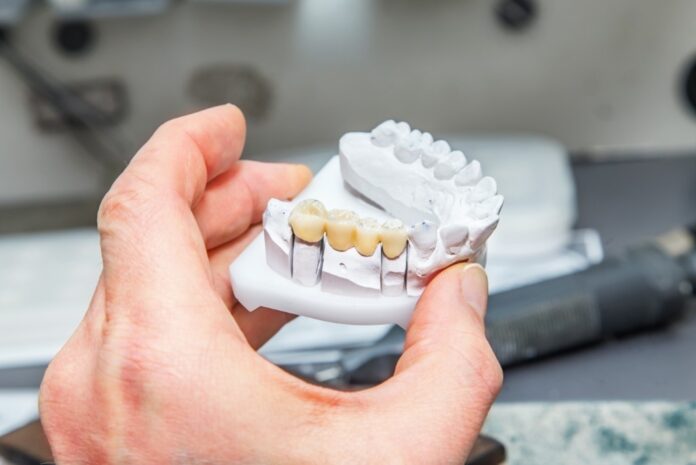A straight and complete set of teeth makes smiles so much more beautiful. But not everyone is born with perfect teeth. What if you’re missing teeth and have visible gaps?
A straight and complete set of teeth makes smiles so much more beautiful. But not everyone is born with perfect teeth. What if you’re missing teeth and have visible gaps?
You have two options: dental bridges and implants. Either solution provides many benefits. But just because the advantages of one sound nice, it doesn’t mean it’s right for you.
In the dental bridge vs implant clash, which should you choose? This article may help you decide what’s best.
1. Longevity and Performance
Unlike traditional dentures, bridges and implants are longer-lasting. These alternatives tend to be made from high-grade materials. This quality makes them feel and perform as if they aren’t artificial teeth.
Dental bridges can last from 10 to 15 years. Even with its longevity, you may need to replace it every five to seven years. Dental implants, on the other hand, tend to have a longer lifespan of 20 to 25 years. They may also require adjustments years later.
A reputable dentist can explain the difference between dental bridge and implant prospects, including how long each may last. They’ll also provide detailed guidance on the pros and cons of both treatment options. After choosing, the dentist can suggest care tips to keep the bridge or implant strong.
2. Impact on Neighboring Teeth
If you’re getting dental bridges or implants, you only have some missing teeth. So, you need to pick an option that won’t significantly affect other teeth you still have standing.
Touching your other teeth is inevitable with bridges. A bridge depends on the adjacent teeth on either side of the gap. Your oral surgeon must reshape nearby teeth and fit them with crowns for the tooth replacement. They must do this step even if the supporting teeth are healthy. Those teeth lose some of their original structure and bone density. In time, the excess stress can lead to cracks or additional dental procedures.
Dental implants, on the other hand, can exist independently. They don’t touch your surrounding teeth, meaning those teeth remain whole. Their independence reduces the alignment shifts bridges may cause by altering bite pressure. If your teeth are healthy and strong, the fact that implants don’t touch them is a great benefit.
3. Bone and Gum Health
When deciding between a dental bridge vs implant, it’s essential to know how each option affects your bone and gum health. The difference lies in the impact on your jawbone.
Bridges fill a visible gap but don’t replace missing tooth roots. Without stimulation, the bone beneath the gap may gradually shrink. The bone loss will alter your face’s shape and create little gaps between the gum and the bridge.
Dental implants involve artificial tooth roots that the surgeon places into the jawbone. You stimulate your teeth whenever you chew to make them healthy. Gums also retain their natural contours around implants, maintaining a vibrant smile.
4. Procedure and Recovery Experience

When choosing a dental bridge vs implant, you must consider the procedure and recovery length. Bridges are often finished in just two or three visits within a few weeks. Recovery is minimal since it involves a non-surgical procedure.
Dental implants require months of oral surgery. Your surgeon will first install the titanium posts into your jawbone. After the bone fuses with the implant, the abutment teeth and dental crown are added. Recovery takes time: usually three to six months after the posts and one to two weeks after the abutment.
5. Cost and Value
Bridges and implants may be expensive. Yet, bridges are typically less costly, at around USD$500 to USD$1,200 per tooth, depending on the grade. Dental insurance can lessen the cost if you still think they’re too expensive.
By contrast, implants could cost USD$3,000 to USD$4,500 per tooth. Insurance is also less likely to cover the procedure. Despite that, they’re often more economical since replacements are rare and implant failure rates are low.
6. Daily Oral Care
Whatever method you opt for, you must continue practicing good oral hygiene. A dental expert will remind you as well, so you don’t forget. Brush and floss your teeth at least twice daily. Proper care maintains good shape for both natural and artificial teeth.
Bridges, unlike implants, don’t protect the surrounding teeth from cavities and decay. You must brush and floss under the bridge to remove trapped food particles in the tight spaces.
That doesn’t mean you’re completely safe with dental implants, though. To keep implants healthy, practice daily oral care and eat soft, nutritious foods.
7. Comfort and Function
Because a bridge rests on crowned teeth, chewing pressure spreads differently than natural teeth. For some, it may feel slightly less natural. Bridges may also dull the sense of feedback when biting into firm or crunchy foods.
Implants connect to the bone, giving stability close to that of natural teeth. Patients often report they stop noticing the implant altogether during daily activities.
8. Aesthetic Outcomes
Aesthetics matter as much as oral health, and bridges and implants can support both. Smiling with visibly missing teeth could affect people’s first impressions of you.
Dental bridges and implants can be crafted to match natural teeth. However, bridges may show small gaps near the gum line as bone and tissue recede over time. These gaps can collect food and cast shadows that draw attention.
Implants, by supporting the bone and gum, usually keep the natural appearance intact. If a crown on an implant needs replacing, it can often be done without affecting the adjacent teeth.
Final Thoughts
Tooth loss shouldn’t stop you from smiling, speaking, or eating comfortably. Choosing between a dental bridge vs implant also shouldn’t keep you at a standstill. Both options have perks and drawbacks regarding longevity, recovery, and price. You need to weigh what works best for you.
So, schedule an appointment with a trusted dentist now. You deserve a healthy and beautiful smile always.
Find a Home-Based Business to Start-Up >>> Hundreds of Business Listings.














































